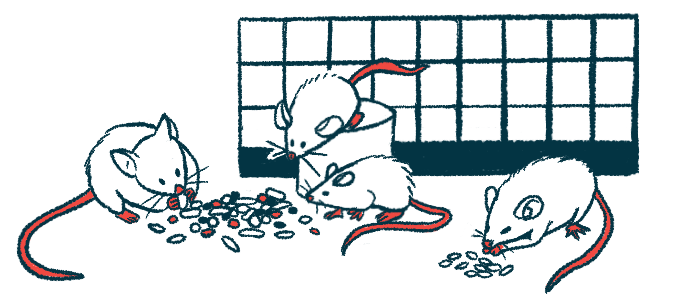Mouse study points to new way to ease high-carb effects in AIP
Study highlights potential metabolic benefits of two natural compounds
Written by |

Supplements of bacteria-derived lipoteichoic acid and alpha-lipoic acid — an insulin sensitizing compound — may help improve blood sugar control and the body’s response to insulin during a high-carbohydrate diet for acute intermittent porphyria (AIP), according to a study in mice.
The study, “Oral lipoteichoic and lipoic acids improve insulin resistance and body composition in porphyria mice on a high-carbohydrate diet,” was published in the Journal of Physiology and Biochemistry by researchers in Italy and Spain.
AIP is caused by mutations that reduce the activity of the PBGD enzyme, which is needed for one step in the production of heme — a component of proteins like hemoglobin, the oxygen-carrying protein in red blood cells. When PBGD activity is too low, some building blocks of heme accumulate to toxic levels in cells, triggering symptoms.
Heme production is partly controlled by sugar, the body’s main source of energy. Doctors have long known that high-carbohydrate diets can ease AIP symptoms. However, these diets can also make cells resistant to insulin, the hormone that helps transport sugar from the blood into cells.
Previous findings hinted at sugar-processing improvements
In an earlier study using lab-grown cells, researchers found that alpha-lipoic acid may help break down sugar for energy. The new mouse study adds evidence that lipoteichoic acid (LTA) — a molecule produced by the probiotic Bifidobacterium animalis — may also help support better blood sugar control and gut health.
To test whether these supplements could help manage hyperinsulinemia (high insulin levels) and keep blood sugar in a healthy range, the researchers used a mouse model of AIP. Mice were fed a high-carbohydrate diet for 12 weeks, either alone or together with Bifidobacterium animalis, alpha-lipoic acid, or LTA.
Compared with healthy mice or AIP mice on a standard diet, AIP mice fed a high-carbohydrate diet developed higher insulin levels and an unhealthy shift in gut bacteria — with fewer beneficial types such as Dorea and Adlercreutzia and more harmful bacteria like Escherichia coli.
When treated with alpha-lipoic acid or LTA, the AIP mice showed better blood sugar control during the high-carbohydrate diet. The proportion of lean muscle to fat also increased — by 20% with alpha-lipoic acid and 33.8% with LTA — showing shifts in body composition. Alpha-lipoic acid increased sugar uptake by muscles and fat tissue, while LTA also helped reduce fat.
AIP mice given LTA also saw their gut bacteria return to a healthier balance, more like that of healthy mice. This suggests that LTA may help restore gut health as well as improve blood sugar control, even during a high-carbohydrate diet.
While these benefits “need to be validated in humans through randomized controlled trials,” the researchers believe their findings “support the potential of targeted oral interventions, particularly LTA and [alpha-lipoic acid] supplementation.”






